Dental Implant Procedure Step by Step: What to Expect During the Surgery?
Dental Care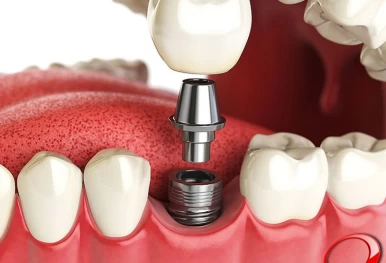
Dental implants have become a game-changer in modern dentistry, offering a durable and natural-looking solution for individuals dealing with tooth loss. The process of getting dental implants involves a series of well-coordinated steps that ultimately result in a restored smile and improved oral health. From the initial consultation to the final placement of the replacement tooth, each stage of the dental implant procedure plays a crucial role in ensuring the success and longevity of the treatment.
In this article, we will take you through the step-by-step timeline of the dental implant procedure, providing a detailed overview of what patients can expect at each stage of treatment.
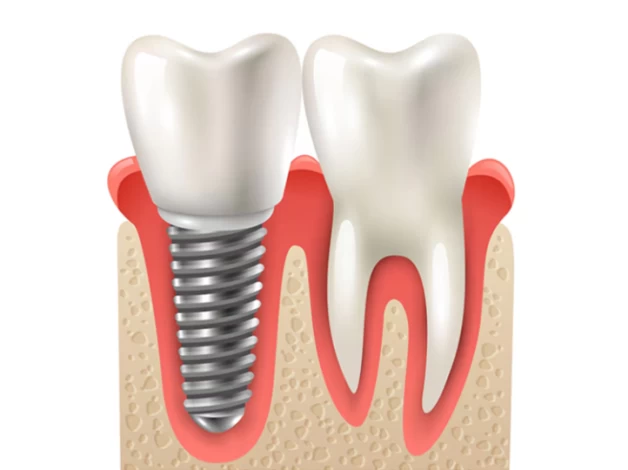
What Is a Dental Implant Procedure Step by Step?
A dental implant procedure is a surgical procedure performed to replace missing teeth with artificial teeth that look and function like real teeth. The procedure involves inserting a metal rod (usually made of titanium) into the jawbone, which serves as a replacement root for the missing tooth. After the rod has fused with the jawbone, an artificial tooth (crown) is mounted onto the rod to complete the restoration.
Dental Implant Procedure Steps are:
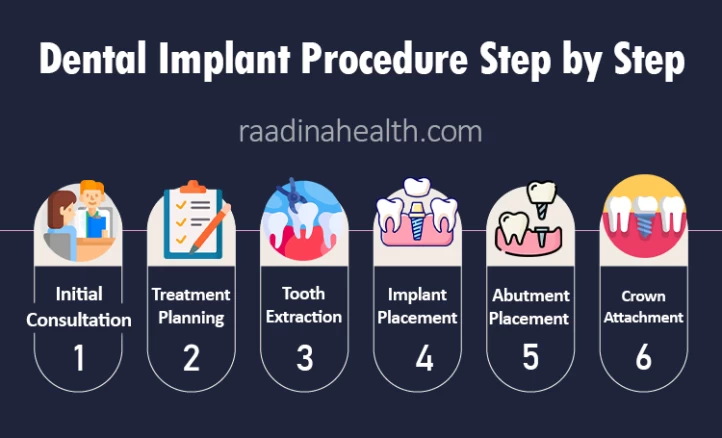
Initial Consultation
The first step in the dental implant procedure is to schedule a consultation with a dentist or oral surgeon. During this appointment, the dentist will evaluate your oral health, take X-rays, and discuss your treatment options.
Treatment Planning
Based on the evaluation and X-rays, a customized treatment plan will be created for you. This plan will outline the number of implants needed, the location of the implants, and the timeline for the procedure.
Tooth Extraction
Tooth extraction is a common dental procedure in which a tooth is removed from its socket in the jawbone. This procedure may be necessary for various reasons, such as severe decay, infection, overcrowding, or trauma.
Implant Placement
Implant placement is a surgical procedure in which a small titanium post is inserted into the jawbone to serve as a replacement root for a missing tooth. This is typically done under local anesthesia to minimize discomfort. The dentist will make an incision in the gum tissue, drill a hole into the jawbone, and carefully place the implant into position.
Healing Period of 3-6 Months for Osseointegration
The healing period for osseointegration, which is the process of the bone fusing with the implant, typically ranges from 3 to 6 months. During this time, the bone around the implant gradually grows and attaches to the implant surface, forming a strong bond. This healing period ensures that the implant is secure and stable before the final restoration is placed on top.
Abutment Placement
An abutment is a connector piece that is attached to the implant and protrudes above the gum line. It serves as the foundation for attaching a dental crown, bridge, or denture to the implant.
During the abutment placement procedure, the gum tissue is reopened to expose the top of the implant. The abutment is then attached to the implant using a screw or cement, depending on the type of abutment and implant system being used. The gum tissue is then carefully repositioned around the abutment and allowed to heal.
Crown Attachment
Crown attachment is the final step in the dental implant process, where a custom-made dental crown is securely attached to the abutment that has been placed on top of the implant. The crown is the visible part of the restoration that resembles a natural tooth in color, shape, and size and completes the dental implant treatment.
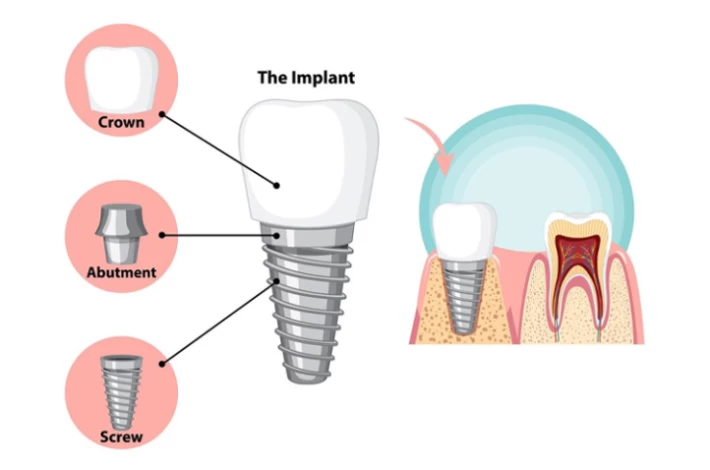
When Is Bone Grafting Necessary?
Bone grafting is necessary for a dental implant procedure when there is insufficient bone in the jaw to support the implant. This can occur due to various reasons, including:
- Tooth loss: When a tooth is lost, the surrounding bone may start to resorb or deteriorate over time, leading to a lack of adequate bone density and volume for implant placement.
- Periodontal disease: Advanced gum disease can damage the bone supporting the teeth, resulting in bone loss that may require bone grafting before implant placement.
- Trauma: Severe facial trauma or injury to the jawbone can cause bone loss, making it necessary to rebuild the bone with a graft before placing dental implants.
- Developmental defects: Some individuals may have congenital conditions or developmental defects that affect the growth and development of the jawbone, requiring bone grafting to create a suitable foundation for dental implants.
Who Is Eligible for Dental Implants?
Not everyone is eligible for dental implants, as certain criteria need to be met to ensure the success of the procedure. Good candidates for dental implants are as follows:
- Individuals with missing teeth;
- Those with good oral health and adequate bone density in the jaw;
- Non-smokers or willing to quit smoking;
- Individuals who are committed to maintaining good oral hygiene;
- People who have realistic expectations about the procedure and outcome.

How Long Does a Dental Implant Procedure Take?
The duration of a dental implant procedure can vary depending on several factors, including the complexity of the case, the number of implants being placed, the patient's overall oral health, and any additional procedures that may be required. In general, the process of getting a dental implant can take a few months to over a year to complete.
The tooth implant process timeline can be:
- Initial Consultation: 1-2 hours;
- Implant Placement: 1-2 hours per implant - However, if additional procedures such as bone grafting or sinus lifting are needed, this step may take longer;
- Healing Period: around 3-6 months, depending on individual healing abilities;
- Abutment Placement: 30-60 minutes per implant;
- Prosthesis Placement: 1-2 hours.
What to Expect After a Dental Implant?
After getting a dental implant, it is normal to experience some discomfort, such as pain, swelling, and bruising around the implant site. Your dentist may prescribe pain medication or recommend over-the-counter options to help manage any discomfort you may feel during the healing process.
Following the surgery, you may need to modify your diet to include soft foods for a few days or weeks to allow the implant site to heal properly. It's important to avoid hard, sticky, or crunchy foods that could disrupt the healing process and potentially cause complications.
Proper oral hygiene is crucial for the success of your dental implant. Your dentist will provide instructions on how to care for your implant, which may include special brushes or rinses to keep the area clean and free from bacteria that could lead to dental implant infection.
Regular follow-up appointments with your dentist are likely necessary to monitor the healing process and ensure that the implant is integrating correctly with the jawbone. These appointments are essential for maintaining the health and longevity of your dental implant.
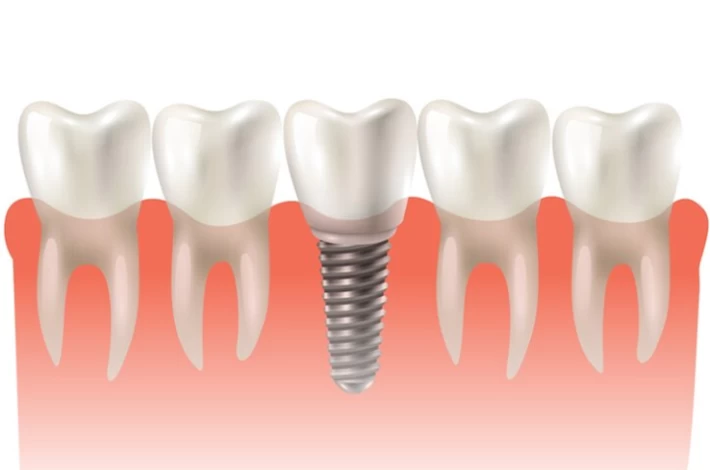
Dental Implants in Iran
Dental implants have gained popularity in Iran as a reliable and effective solution for replacing missing teeth, and nowadays, Iran is considered one of the top countries for tooth implants. With advancements in dental technology and the availability of skilled dental professionals, many Iranians are opting for dental implants to restore their smiles and improve their oral health. The cost of dental implants in Iran is relatively affordable compared to Western countries, making it an attractive option for patients seeking high-quality dental care at a lower cost.
In Iran, dental implant procedures are performed by experienced dentists and specialists who adhere to international standards of care. Patients can expect personalized treatment plans tailored to their specific needs, ensuring successful outcomes and long-lasting results. The growing number of dental clinics and hospitals offering dental implant services across Iran reflects the increasing demand for this advanced dental treatment option.
Final Word
The dental implant procedure is a complex but highly effective solution for replacing missing teeth and restoring oral health and function. From initial consultation to final restoration, each step of the process is carefully planned and executed by skilled professionals to ensure optimal results for the patient. While the procedure may involve multiple appointments and recovery time, the benefits of dental implants, such as improved aesthetics, speech, and chewing ability, make it a worthwhile investment in long-term oral health and overall well-being. If you are considering dental implants, be sure to consult with a qualified dentist or oral surgeon to determine if this treatment option is right for you.
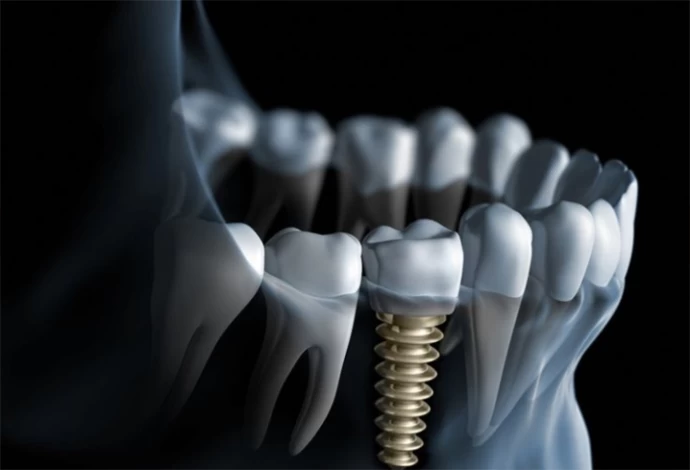
FAQs
How painful is getting a dental implant?
Most patients report feeling minimal discomfort during the implant placement surgery itself, as local anesthesia is used to numb the area. Some soreness and discomfort may be experienced in the days following the procedure, but this can typically be managed with over-the-counter pain medications.
Will dental implants last forever?
Dental implants are designed to be a long-term solution for replacing missing teeth, and they have the potential to last a lifetime with proper care and maintenance. However, it is important to note that various factors, including oral hygiene practices, overall health, lifestyle habits, and the quality of the implant placement procedure, can influence the longevity of dental implants.
Do you get temporary teeth while waiting for implants?
Yes, in many cases, patients may be provided with temporary teeth while they are waiting for their dental implants to be placed and integrated into the jawbone. These temporary teeth are also known as provisional restorations or temporary crowns.
What is the success rate of dental implants?
Dental implants have a high success rate of over 95% when performed by a skilled and experienced dental implant specialist. Good oral hygiene practices and regular dental check-ups can help to ensure the long-term success of your dental implants.
Is there any risk of infection during the dental implant procedure?
Like with any surgical procedure, there is a risk of infection during the dental implant procedure. However, dentists and oral surgeons take precautions to minimize this risk, such as the use of sterile instruments and strict sterile techniques. Additionally, patients are usually prescribed antibiotics before and after the procedure to reduce the risk of infection further.
Can I have a dental implant procedure if I have gum disease?
It is possible to have a dental implant procedure if you have gum disease. However, it is important to first address and treat the gum disease before undergoing dental implant surgery. Gum disease can lead to complications with dental implants, such as implant failure or infection.
 WhatsApp
WhatsApp
 Telegram
Telegram
 Facebook
Facebook
 Email
Email


No reviews
Your comment